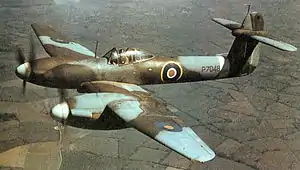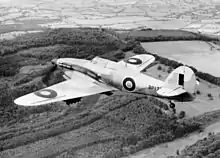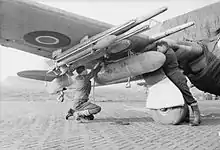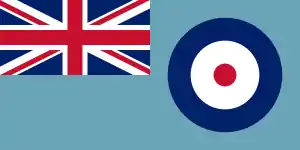No. 137 Squadron RAF
No. 137 Squadron RAF existed briefly as a day bomber unit in World War I but it never became operational. During World War II it flew as one of the two Whirlwind squadrons before converting to Hurricane Mk.IV fighter-bombers and later the Hawker Typhoon in the same role. The squadron was disbanded in August 1945.
| No. 137 Squadron RAF | |
|---|---|
| Active | 1 Apr 1918 – 4 Jul 1918 20 Sep 1941 – 25 Aug 1945 |
| Country | |
| Branch | |
| Part of | RAF Fighter Command |
| Motto(s) | Do right, fear naught[1][2] |
| Insignia | |
| Squadron Badge heraldry | A horse's head couped[1][2] |
| Squadron Codes | SF (Feb 1941 – Aug 1945)[3][4] |
History
Formation and World War I
No. 137 Squadron RAF existed briefly as a unit working up to be a day bomber unit on Airco DH.9s during World War I, but it never became operational. It was formed at Shawbury on 1 April 1918 and was disbanded there on 4 July 1918, together with 12 other such units. Plans to reinstate the squadron in September as laid out in Air Organisation Memorandum 939 of 13 July 1918 came to nought as Air Organisation Memorandum 999 of 17 August 1918 cancelled these.[5][6]
Second World War

The squadron was reformed at Charmy Down on 20 September 1941 and equipped with the then brand new two-engined Westland Whirlwind four-cannon fighter. The squadron became operational with them on 20 October and flew its first mission (a mandolin) four days afterwards. Unfortunately the new CO, S/Ldr Sample, was killed four days after this in a mid-air collision with a new pilot. Two days later another pilot crashed into the sea. After this bad start, No. 137 became non-operational for a period before resuming with coastal missions on 11 November. On one such mission on 12 February 1942, to escort some destroyers, they met by accident the fighter screen around the Scharnhorst and the Gneisenau, losing four pilots in the event.[7]


In June 1943 the by now worn-out Whirlwinds were replaced with Hurricane Mk.IV fighter-bombers and in July the squadron flew operationally with them again until February 1944 when the Hurricane was exchanged for the more modern and higher performance Hawker Typhoon. 137 flew this new fighter-bomber operationally from 8 February 1944 until 25 August 1945, when it was disbanded at RAF Warmwell by being renumbered to 174 Squadron.
Organisation
Commanding officers
| Served from | Name | Notes |
|---|---|---|
| September 1941 | Sqn/Ldr J. Sample, DFC | |
| November 1941 | Sqn/Ldr H.St.J. Coghlan | |
| May 1943 | Sqn/Ldr J.B. Wray, DFC | |
| December 1943 | Sqn/Ldr J.R. Dennehey, DFC | |
| April 1944 | Sqn/Ldr G. Piltingsrud, DFC | |
| September 1944 | Sqn/Ldr E. T. Brough, DFC | |
| December 1944 | Sqn/Ldr R.G.V. Barraclough | |
| March 1945 | Sqn/Ldr D. Murray, DFC |
Squadron Bases
| Arrival | Base |
|---|---|
| 1 April 1918 | RAF Shawbury |
| 20 September 1941 | RAF Charmy Down |
| 8 November 1941 | RAF Coltishall |
| 1 December 1941 | RAF Matlaske detachments at RAF Snailwell & RAF Drem |
| 24 August 1942 | RAF Snailwell |
| 17 September 1942 | RAF Manston |
| 12 June 1943 | RAF Rochford |
| 8 August 1943 | RAF Manston |
| 14 December 1943 | RAF Lympne |
| 2 January 1944 | RAF Colerne |
| 4 February 1944 | RAF Lympne |
| 1 April 1944 | RAF Manston |
| 13 August 1944 | Coulombs (B.6) |
| 29 August 1944 | Créton (B.30) |
| 3 September 1944 | Amiens/Glisy (B.48) |
| 6 September 1944 | Melsbroek (B.58) |
| 22 September 1944 | Eindhoven (Welschap) (B.78) |
| 13 January 1945 | Helmond (B.86) |
| 11 April 1945 | Twente (B.106) |
| 13 April 1945 | Hopsten (B.112) |
| 17 April 1945 | Langenhagen (B.120) |
| 30 April 1945 | Lüneburg (B.156) |
| 7 May 1945 | RAF Celle (B118) |
| 9 May 1945 | Kastrup (B160) |
| 21 June 1945 | Husum (B172) |
| 11 July 1945 | Lübeck (B158) |
| 20 August 1945 | RAF Warmwell |
References
Notes
- Rawlings 1978, p. 276.
- Halley 1988, p. 210.
- Bowyer and Rawlings 1979, p. 93.
- Flintham and Thomas 2003, p. 106.
- "Historic Squadrons". Archived from the original on 16 March 2011. Retrieved 12 July 2009.
- Jefford 2001, pp. 107–108.
- Rawlings 1978, pp. 276–277
- Rawlings 1978, p. 278.
- Jefford 2001, pp. 63 and 224–228.
Bibliography
- Bowyer, Michael J.F. and John D.R. Rawlings. Squadron Codes, 1937–56. Cambridge, UK: Patrick Stephens Ltd., 1979. ISBN 0-85059-364-6.
- Flintham, Vic and Andrew Thomas. Combat Codes: A full explanation and listing of British, Commonwealth and Allied air force unit codes since 1938. Shrewsbury, Shropshire, UK: Airlife Publishing Ltd., 2003. ISBN 1-84037-281-8.
- Halley, James J. The Squadrons of the Royal Air Force & Commonwealth 1918–1988. Tonbridge, Kent, UK: Air Britain (Historians) Ltd., 1988. ISBN 0-85130-164-9.
- Jefford, C.G. RAF Squadrons, a Comprehensive record of the Movement and Equipment of all RAF Squadrons and their Antecedents since 1912. Shrewsbury, Shropshire, UK: Airlife Publishing, 1988 (second edition 2001). ISBN 1-85310-053-6.
- Rawlings, John D.R. Fighter Squadrons of the RAF and their Aircraft. London: Macdonald and Jane's Publishers Ltd., 1969 (2nd edition 1976, reprinted 1978). ISBN 0-354-01028-X.
External links
| Wikimedia Commons has media related to No. 137 Squadron RAF. |
